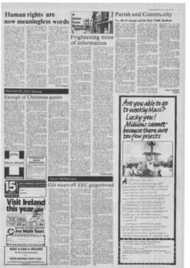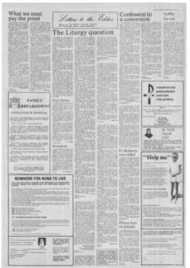Page 3, 15th April 1977
Page 3

Report an error
Noticed an error on this page?If you've noticed an error in this article please click here to report it.
Tags
Share
Related articles
Radio & Television By Eve Macadam
Searching For Toys Among The Tourists
We No Longer Have To Earn The Ermine
Guilt On The Profiteers' Gingerbread
Radio
Gilt wears off EEC gingerbread
THERE is nothing like a good inter-party and infra-party row at the start of a new session of
Parliament. It can be guaranteed to bore the public in
direct proportion to the interest
it excites in politicians. Thus it will be next week, when on
Wednesday we start the first day of our two-day debate on direct elections to the European Economic Community.
The EEC is not as popular now as it was just a few years ago, when the country voted so overwhelmingly to join it. The gilt has come off the gingerbread. Our economic difficulties remain with us, the export markets we were promised have not materialised and our food continues to rocket in price. Even on a simple matter like an agreed fishing policy — so important for my constituents, but even more important for the scattered communities around our islands — the EEC cannot reach an agreement. The public see it as one great big bore. When our Ministers battling away at Brussels achieve considerable victories they are unimpressed: that the Ministers are battling for Britain pleases the electorate but of the results they are never quite certain.
Now that we are members of the EEC, the role that our Ministers do play and the part that a directly elected Parliamentary Assembly might play in the European Cornmunity becomes of immense importance.
In case any of my readers have forgotten, I was against Britain entering the EEC. In case it does not immediately become selfevident, I do not favour direct elections to the European Parliament.
My hostility is based on two principles: the nature of Parliamentary Assemblies and the future of Europe, and the procedures to be adopted in electing members. (The system of voting to be used I shall consider next week).
The functions of any Parliamentary Assembly is to legislate and control the policies of the executive
arm of government. Within the EEC the executive deciding policy is the Council of Ministers, representing all nations belonging to the Community. The bureaucratic machine headed by the Commission of which Mr Roy Jenkins is now the chairman, translates the policy decisions of Ministers into legislative measures and through its bureaucracy seeks to implement the policy decisions.
In passing, it creates the wine lakes needing to be changed into industrial alcohol; butter mountains are built for non-member countries of the EEC to quarry cheaply while the consumer in the Community pays more for his or her food and wine. But these are only trifling matters about the way we all live about which nobody on more than £20,000 a year should really be bothered.
The argument for direct elections is that the heads of government of community members agreed that proposals should be made for direct elections to the European Parliament in May or June of 1978, and that the possibility of a future elected Parliament was envisaged in the original Treaty of Rome. The present nominated Parliament, has no power whatsoever except to dismiss the full Commission and to discuss possible legislation. It has no legislative power of its own, nor can it alter individual items in the Community Budget. Quite properly; members of the Council of Ministers wish to preserve that power to themselves, for they are answerable for its use to their own national parliaments.
The present members of the European Parliament are chosen as representatives of their national parliaments in proportion to the party strengths. The composition of such a delegation is changed as elections are held in members'1 countries.
Assuming that direct, elections are to be held, whether they are on the first-past-the-post system or a proportional system, the constituencies of the new members will be far larger than the present Parliamentary constituencies.
To whom does the loyalty of the European elected member lie: to his own government or to the new Parliament to which he has been elected? What is his mandate from his electors compared with the member for a single constituency in his national parliament?
Does he take the European view: does he take the Westminster view? lf, as it is proposed, the new European Parliament sets fixed terms the relationship of a British member of the European Parliament to his own government if it changes while he is sitting in the European Parliament will be at best confused and his loyalties divided as he decides whether his policies are to be dictated by the policies of Britain or of the EEC?
If there is an elected European Assembly there will be demands for that Assembly to gain more power at the expense both of the Council of Ministers and of the National Parliaments. Thus, power will pass to the central organisation with a corresponding diminishing of power and the responsibility and flexibility of the United Kingdom Parliament.
Already many economic powers which we ought to have retained to protect our industries and help us in our present economic difficulties are not available to us because of our membership of the European Community. If further power slips to Brussels and Strasbourg an ability to decide our own future will be considerably undermined.
Some of these points were discussed during the ill-fated referendum campaign of two years ago. Now their significance is becoming all too apparent as more and more people find themselves adversely affected by decisions taken in Brussels. The fundamental question of our national independence has now come to the fore as the pace for direct elections increases.
I hope that Direct Elections Bill, when it comes before the House, will be thrown out: but I fear that the unhealthy coalition of Tories, Liberals and Labour Europeanists will triumph to the plaudits of the media and the detriment of our island.
blog comments powered by Disqus









